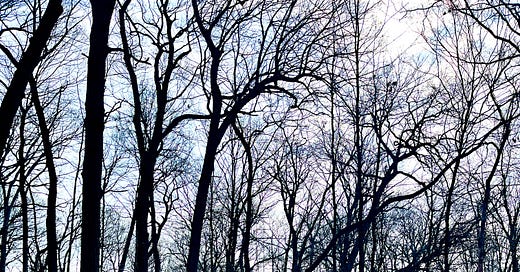It’s early morning and my wife and I stand at the trailhead. The dog is at our side. We both—no, all three of us—need this.
The air is cool but carries warmth. It’s in the wind, this coming spring. Yes, the calendar claims the season is already here, but it’s not truly, not quite. Buds on the trees appear to be anticipating a change, contemplating the best time to burst forth. Cornflowers, not quite in bloom, push through ground twigs, dead leaves, and a layer of decay from plants that had died-back a season ago. Even the daffodils, one of the first flowers to open to the seasonal sun have not yet arrived. They are right there, but appear to be hesitating. The forest and meadows are primed and pushing toward spring, seemingly in desperation for rebirth. They, and all of us, want a new season. Yet, the world is not yet ready to give it to us.
Although this past winter here in the Midwest could be categorized as mild in terms of climate, its days have been harsh. The winds of despots, kings, oligarchs, and foolish men carried in a sweeping, bitter storm, an ICE storm, dumping the snows of intolerance all across our nation. Billionaires laugh and the rest of us weep. Democracy has cracked at the seams. The Constitution is burning at the edges, while we send the rich into space, universities are bullied, and families are sent to prisons in El Salvador. While we slash away at our educational systems and take food and shelter from those among us who are most in need.
It was during the winter months, that I returned to Yeats’ poem, “The Second Coming,” over and over again.
It’s frightening how a poem produced more than 100 years ago after The Great War about the undoing of humanity and civilization could have been written today. Still, Yeats’ desperate words combined with the burgeoning season, as hesitant as it might be, remind us that we can’t be still. And although we might shake our heads and wipe away tears, we must bound our way toward an eternal spring.
The trail we follow winds trough stately trees of oak and maple, tall pines stretch toward the sky just over the hill, glints of sun reflect off the branches, and the land opens to a meadow, a prairie, and to several small lakes, and all around is birdsong. A woodpecker works. Frogs croak. Everywhere a push toward spring. And on the narrowing trail, deeper into the trees, I spot the discarded skin of a squirrel’s tail. A hawk, I say aloud. It’s meal; it’s sustenance. Nature being nature. Not all in the Garden of Eden is beautiful and serene. Snakes lurk, of course, and above the trees, birds of prey seek out their targets. Unnerving but necessary. Still, we walk, seeking the sublime. There is no other way to make this journey.
Later that day when we return home, I try to recall a Mary Oliver poem, one in particular she had written about joy in the midst of heartbreak. It took some looking, but when I found it, I knew she, too, must have endured, at least once, her own merciless winter while pining for a hopeful spring.
David W. Berner is the author of several books of award-winning fiction and memoir. His latest, Daylight Saving Time: The power of growing older is available now. His debut poetry collection, Garden Tools is due out in October 2025 from Finishing Line Press. His novella, American Moon will be published by Regal House Publishing in 2026.







You have such a gift with words. This piece was so beautifully written. Thank you.
It is comforting but also frustrating to know that others have felt the same. If only we could learn from history and develop emotional intelligence as a species .